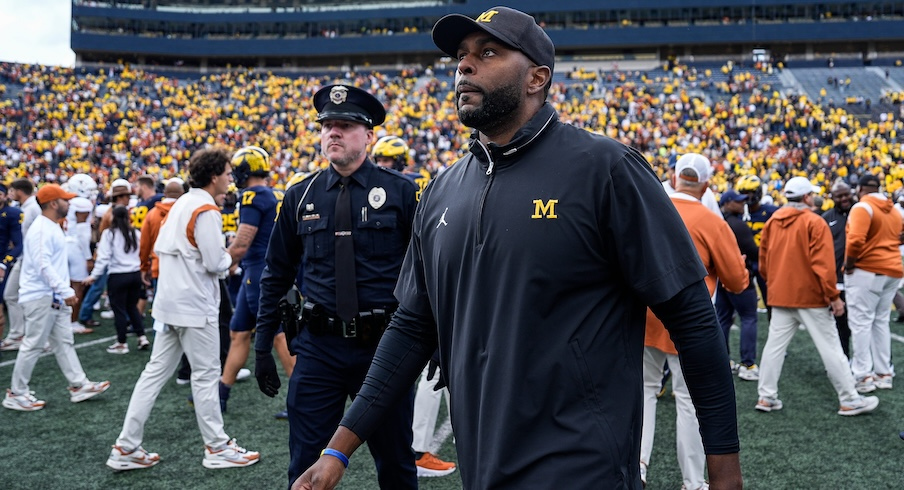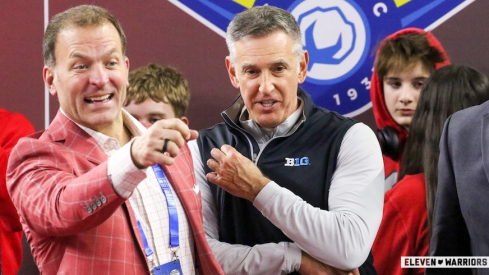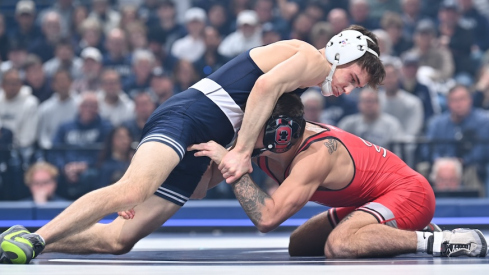Michigan has received its long-awaited punishment from the NCAA for its impermissible in-person scouting scheme orchestrated by former analyst Connor Stalions.
For many Buckeye fans, it's less of a slap and more of a poke on the wrist.
A fine is the harshest sanction levied against the Wolverines, one equivalent to two years of lost postseason revenue, 10% of its football budget, 10% of its football scholarships and an additional $50,000. ESPN's Pete Thamel reported that it "could be in the range of $30 million" total.
On top of his self-imposed two-game suspension in 2025, Michigan coach Sherrone Moore will also be suspended for one game in 2026 and was handed a two-year show-cause penalty. The Wolverines will also receive a 25% reduction in official visits for football and be put on four years of probation.
But the Wolverines will not receive a postseason ban for their sign-stealing scheme, nor will they be required to vacate any wins. That's despite "overwhelming evidence" of their impermissible scouting scheme, per the NCAA.
NCAA penalties for Michigan:
— Ross Dellenger (@RossDellenger) August 15, 2025
- 4 years probation
- $50K fine + 10% of FB teams budget
- fine equivalent to loss of 2 postseason $$$ (CFP/bowl)
- fine equivalent to cost of 10% of all FB scholarships
- 25% reduction in FB official visits
- 14-week prohibition on recruiting comms
Stalions, who spearheaded the Wolverines’ sign-stealing efforts, received an eight-year show-cause penalty from the NCAA. Jim Harbaugh, the head coach at the time for Michigan, received a 10-year show-cause penalty. Former Michigan staffer Denard Robinson received a three-year show-cause penalty.
The NCAA's investigation found that Michigan’s violations warranted a multi-year postseason ban, but the Committee on Infractions decided against that sanction because it would "unfairly penalize student-athletes for the actions of coaches and staff no longer associated with the Michigan football program."
Why didn't Michigan receive a postseason ban or scholarship reductions? Before this new era of college athletics, it would have, per the NCAA findings.
— Ross Dellenger (@RossDellenger) August 15, 2025
The association is deviating from those penalties. pic.twitter.com/bWGzPASKiY
The sanctions come nearly two years after the NCAA launched its investigation into the Wolverines’ sign-stealing scheme. While the act of sign stealing itself is not banned by NCAA rules, scouting opponents in person and filming opponents’ signals are prohibited. Stalions resigned from his position two weeks after the investigation started.
The Big Ten took swift action against the Wolverines, suspending former Michigan head coach Jim Harbaugh for the final three games of the 2023 regular season after determining the Wolverines violated the Big Ten Sportsmanship Policy. The Big Ten’s official notice of disciplinary action revealed that the NCAA told the Big Ten it “knew and could prove” Stalions violated NCAA rules by coordinating a “vast off-campus, in-person advance scouting scheme involving a network of individuals.”
Despite that, Michigan remained eligible for the 2023 postseason and went on to win the national championship. Harbaugh, who received a four-year show-cause penalty from the NCAA last August for recruiting violations unrelated to the sign-stealing investigation, left the Wolverines in January 2024 to become the head coach of the Los Angeles Chargers.
Michigan refused to negotiate penalties with the NCAA for its sign-stealing operation. As a result, the infractions process dragged out for more than 21 months. While Michigan received its Notice of Allegations from the NCAA last August, the Committee on Infractions did not hold its hearing until this June.
Per the NCAA's report, in fact, current and former Wolverines central to the investigation worked to hide and destroy evidence of their scheme.
NEW: From the NCAA's report on Michigan:
— Chris Vannini (@ChrisVannini) August 15, 2025
" the true scope and scale of the schemeincluding the competitive advantage it conferredwill never be known due to individuals intentional destruction and withholding of materials and information."
From the NCAA's report:
Stalions also admitted during the hearing that he disposed of his phone in a pond. In a recorded phone call, Stalions said his film was also at the bottom of a pond. Additionally, throughout the investigation, Stalions violated confidentiality requirements, disclosing information related to the investigation to the public. The panel stated, "In short, Stalions' multiple and repeated failures to cooperate are some of the worst the COI has ever seen."
Despite Michigan’s lack of cooperation, the NCAA ultimately decided not to strip Michigan of any of its accomplishments that occurred during Stalions’ time with the program, nor will it prevent the Wolverines from participating in this year’s College Football Playoff.
That comes in contrast to the penalties Ohio State received for the Tattoo-Gate scandal in 2010, when Ohio State was forced to vacate all of its wins from the 2010 season and was banned from the postseason in 2012.


